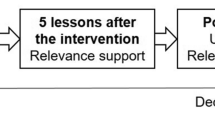Abstract
This study was conducted to investigate the effectiveness of a treatment designed to improve college algebra students’ attitudes toward mathematics. Keller’s ARCS motivational design model was used as a guiding framework for the development of a motivational video, which was delivered online. The application of motivational design to improve mathematics attitudes in an online environment extends the use of motivational design. A pretest-posttest control group design was used to test the effectiveness of the treatment. The participants in this study were 43 students enrolled in a college algebra course offered at a large state university in the mid-Atlantic region of the United States. Statistically significant results were observed for improved attitudes toward mathematics.
Similar content being viewed by others
References
Aiken, L. R. J. (1976). Update on attitudes and other affective variables in learning mathematics. Review of Educational Research, 46(2), 293–311.
Alkhateeb, H. M., & Mji, A. (2005). Attitudes of university precalculus students toward mathematics. Psychological Reports, 96(2), 257–258.
Bleyer, D., Pedersen, K., & Elmore, P. (1981). Mathematics: A critical filter for career choices. Journal of Career Development, 8(1), 46–56.
Chamberlin, S.A. (2010). A review of instruments created to assess affect in mathematics. Journal of Mathematics Education, 3(1), 167–182.
Dogbey, G. Y. (2010). Attitudes of community college developmental students toward mathematics and their perception of mathematically intensive careers. Unpublished Doctoral Dissertation, Ohio University, Athens, OH.
Evans, B. (2007). Student attitudes, conceptions, and achievement in introductory undergraduate college statistics. The Mathematics Educator, 17(2), 24–30.
Fennema, E., & Peterson, P.L. (1985). Autonomous learning behavior: A possible explanation of sex-related differences in mathematics. Educational Studies in Mathematics, 16(3), 309–311.
Fennema, E., & Sherman, J. A. (1976). Fennema-Sherman mathematics attitudes scales: Instruments designed to measure attitudes towards the learning of mathematics by males and females. JSAS Catalog of Selected Documents in Psychology, 6(1), 31–32.
Galbraith, P., & Haines, C. (1998). Disentangling the nexus: Attitudes to mathematics and technology in a computer learning environment. Educational Studies in Mathematics, 36(3), 275–290.
Hemmings, B., & Kay, R. (2010). Prior achievement, effort, and mathematics attitude as predictors of current achievement. Australian Educational Researcher, 37(2), 41–58. Retrieved from http://0-www.eric.ed.gov.novacat.nova.edu/ERICWebPortal/contentdelivery/servlet/ERICServlet?accno=EJ907917
House, J. D. (1995). Student motivation, previous instructional experience, and prior achievement as predictors of performance in college mathematics. International Journal of Instructional Media, 22(2), 157–167.
Keller, J. M. (1987). Development and use of the ARCS model of instructional design. Journal of Instructional Development, 10(3), 2–10.
Keller, J. M., & Subhiyah, R. (1993). Manual for the Course Interest Survey (CIS). Florida State University.
Kim, C., & Keller, J. M. (2007). Effects of motivational and volitional email messages (MVEM) with personal messages on undergraduate students’ motivation, study habits and achievement. British Journal of Educational Technology, 39(1), 36–51.
Kim, C., & Keller, J. M. (2010). Motivation, volition, and belief change strategies to improve mathematics learning. Journal of Computer Assisted Learning, 26(5), 407–420.
Kim, C., & Keller, J. M. (2011). Towards technology integration: The impact of motivational and volitional email messages. Educational Technology Research and Development, 59(1), 91–111.
Kim. C., & Pekrun, R. (in press). Emotions and motivation in learning and performance. Chapter to appear in the Handbook for Research on Educational Communications and Technology.
Lent, R. W., Lopez, F. G., & Bieschke, K. J. (1991). Mathematics self-efficacy: Sources and relation to science-based career choice. Journal of Counseling Psychology, 38(4), 424–430.
Ma, X., & Kishor, N. (1997). Assessing the relationship between attitude toward mathematics and achievement in mathematics: A meta-analysis. Journal for Research in Mathematics Education, 28(1), 26–47.
Ma, X., & Willms, J. D. (1999). Dropping out of advanced mathematics: How much do students and schools contribute to the problem? Educational Evaluation and Policy Analysis, 21(4), 365–383.
Mathematics Association of America, Curriculum Renewal Across the First Two Years, subcommittee of the Committee on the Underraduate Program in Mathematics (2007). CRAFTY guidelines for college algebra. Retrieved February 6, 2009, from http://www.maa.org/cupm/crafty
Mayer, R. E. (2001). Multimedia learning. New York: Cambridge University Press.
Mayes, R., Chase, P. N., & Walker, V. L. (2008). Supplemental practice and diagnostic assessment in an applied college algebra course. Journal of College Reading and Learning, 38(2), 7–30.
McLeod, D.B. (1988). Affective issues in mathematical problem solving: Some theoretical considerations. Journal for Research in Mathematics Education, 19(2), 134–141.
National Mathematics Advisory Panel. (2008). Foundations for success: The final report of the national mathematics advisory panel. Retrieved from http://www2.ed.gov/about/bdscomm/list/mathpanel/report/final-report.pdf.
Neale, D. C. (1969). The role of attitudes in learning mathematics. Arithmetic Teacher, 16, 631–640.
Pedhazur, E. J., & Schmelkin, L. P. (1991). Measurement, design, and analysis: An integrated approach. Hillsdale, NJ: Lawrence Erlbaum Associates.
Song. S.H., & Keller, J.M. (2001). Effectiveness of motivationally adaptive computer-assisted instruction on the dynamic aspects of motivation. Educational Technology Research & Development, 49(2), 5–22.
Twigg, C. A. (2003). Improving learning and reducing costs: New models for online learning. EDUCAUSE Review(September/October), 28–38.
Wadsworth, L. M., Husman, J., Duggan, M. A., & Pennington, M. N. (2007). Online mathematics achievement: Effects of learning strategies and self-efficacy. Journal of Developmental Education, 30(3), 6–14.
Zan, R., & Di Martino, P. (2007). Attitude toward mathematics: Overcoming the positive/negative dichotomy. The Montana Mathematics Enthusiast, Monograph 3, 157–168.
Author information
Authors and Affiliations
Rights and permissions
About this article
Cite this article
Hodges, C.B., Kim, C. Improving college students’ attitudes toward mathematics. TECHTRENDS TECH TRENDS 57, 59–66 (2013). https://doi.org/10.1007/s11528-013-0679-4
Published:
Issue Date:
DOI: https://doi.org/10.1007/s11528-013-0679-4




